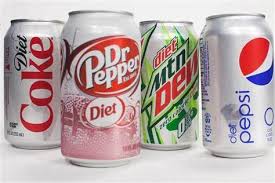|
|

|
|
I hope this newsletter finds you and your family well. This has certainly been a busy month for me. Baseball is in full swing and the Brewers are looking good (how about Eric Thames?). Great job by our front office in acquiring talent! The future does look bright. I have had my passport in use as well traveling with the Bucks to Toronto. Tonight is a decisive game and it has been a great to be part of the playoff run. My schedule has been crazy but it has been worth it!
This month I have three articles looking at how parts of our diet affect our health. The first article shows a link between artificially sweetened drinks, strokes and dementia. Definitely check it out before popping that diet soda.
The second article reaffirms the link between insulin resistance and dementia. Yet another reason to get our insulin levels under control. There is a drive by some to add a type 3 diabetes classification which is related to brain affects of high blood sugar and insulin resistance.
Finally, high uric acid levels are linked to metabolic dysfunction and cardiovascular disease, not just gout. Lowering this level is possible in a short time with some dietary changes. Check out the third article for details. It's not a bad idea for all of us.
Click on the links the the left to check out our
web site
...
|
|
Drink Diet Coke, Have a Stroke?
|
Artificially sweetened drinks tied to stroke and dementia

Artificially sweetened drinks are marketed as a healthier choice than sugar sweetened drinks. The consumption of these drinks is rising, especially among children. Previous studies have shown a link between the artificially sweetened drinks and increased incidence of metabolic syndrome, type 2 diabetes, and hemorrhagic strokes. Some studies have shown an increased risk of heart attacks as well, but this relationship isn't as well defined. This prospective study, published in
Stroke, found that over 10 year follow up higher recent and cumulative intake of artificially sweetened soft drinks was associated with increased risk of ischemic stroke, all cause dementia and Alzheimer's dementia. This was independent of smoking, diet quality, physical activity and total caloric intake. Compared with no intake, the group drinking the artificially sweetened drinks had nearly three times the risk of stroke and dementia!
Abstract:
-
Background and Purpose: Sugar and artificially-sweetened beverage intake have been linked to cardiometabolic risk factors, which increase the risk of cerebrovascular disease and dementia. We examined whether sugar- or artificially sweetened beverage consumption was associated with the prospective risks of incident stroke or dementia in the community-based Framingham Heart Study Offspring cohort.
-
Methods: We studied 2888 participants aged >45 years for incident stroke (mean age 62 [SD, 9] years; 45% men) and 1484 participants aged >60 years for incident dementia (mean age 69 [SD, 6] years; 46% men). Beverage intake was quantified using a food-frequency questionnaire at cohort examinations 5 (1991-1995), 6 (1995-1998), and 7 (1998-2001). We quantified recent consumption at examination 7 and cumulative consumption by averaging across examinations. Surveillance for incident events commenced at examination 7 and continued for 10 years. We observed 97 cases of incident stroke (82 ischemic) and 81 cases of incident dementia (63 consistent with Alzheimer's disease).
-
Results: After adjustments for age, sex, education (for analysis of dementia), caloric intake, diet quality, physical activity, and smoking, higher recent and higher cumulative intake of artificially sweetened soft drinks were associated with an increased risk of ischemic stroke, all-cause dementia, and Alzheimer's disease dementia. When comparing daily cumulative intake to 0 per week (reference), the hazard ratios were 2.96 (95% confidence interval, 1.26-6.97) for ischemic stroke and 2.89 (95% confidence interval, 1.18-7.07) for Alzheimer's disease. Sugar-sweetened beverages were not associated with stroke or dementia.
-
Conclusions: Artificially sweetened soft drink consumption was associated with a higher risk of stroke and dementia.
This study adds to the growing medical literature that artificially sweetened soft drinks are not healthy. We don't understand the exact mechanism for this although several have been proposed. Since we know sugar sweetened drinks are not healthy, as a society we are switching over to artificially sweetened drinks as a substitute. However, we may not be improving our health (or even our weight). Multiple studies have shown increased risk of a plethora of medical issues with these beverages including diabetes and metabolic syndrome (what people are trying to avoid!). This article adds ischemic stroke, dementia, and Alzheimer's dementia to the list. We should all work to lower our intake of both sugar and artificially sweetened beverages. This may be especially important in our children. There is nothing beneficial for them.
|
|
|
Link between insulin resistance and cognitive impairment
We have known for some time that people with diabetes have higher rates of cognitive impairment, but the exact mechanism hasn't been evident. This study, published in the journal
Diabetes, followed over 2000 postmenopausal women over 15 years to see if metabolic syndrome would lead to an increase in cognitive impairment. They found that of the signs of metabolic syndrome, impaired fasting glucose and insulin resistance were most correlated with cognitive impairment. However, the more factors one has (high blood pressure, high BMI, low HDL, high triglycerides, high fasting blood sugar), the higher the rate of impairment.
-
Dementia and type 2 diabetes are both characterized by long prodromal phases challenging the study of potential risk factors and their temporal relation. The progressive relation between metabolic syndrome, insulin resistance, and dementia has recently been questioned, wherefore the aim of this study was to assess the potential association between these precursors of type 2 diabetes and cognitive dysfunction. Using data from the Prospective Epidemiological Risk Factor study (n=2,103), a prospective study of elderly women in Denmark, we found that impaired fasting plasma glucose was associated with 44% (9%-91%) larger probability of developing cognitive dysfunction. In addition subjects above the HOMA-IR threshold (HOMA-IR > 2.6) had 47% (9%-99%) larger odds of cognitive dysfunction. The associations could indicate that a significant proportion of dementia cases in women is likely to be preventable by effective prevention and control of the insulin homeostasis.
The link between insulin resistance and dementia is very interesting. Insulin is needed to bring glucose into cells. The memory areas of the brain have a large number of insulin receptors and the brain runs on glucose. So it makes sense if a person has insulin resistance these receptors could be impaired leading to potential memory issues. We also find amyloid deposits in the brains of Alzheimer's patients. These deposits are also found around the pancreas of patients with diabetes. This shows that the amyloid may not be the cause of the dementia, but rather a marker of insulin resistance. There is still a lot of work to be done in this area, but it certainly makes one want to avoid or improve insulin resistance if dementia is a concern.
|
|
Just DASH!
|
DASH diet can reduce uric acid quickly

High levels of uric acid are known to cause gout. However, it is also a marker of metabolic dysfunction and cardiovascular mortality. Lowering uric acid levels is not just to treat gout but to lower risk of heart disease. This study, in
Clinical Rheumatology, showed people following the
DASH diet had significant improvements in uric acid levels within 30 days which was sustained for 3 months. This diet is rich in vegetables, fruit, low-fat dairy and lower in saturated fat. This could also lead to lower rates of metabolic dysfunction and cardiovascular mortality.
Abstract:
-
The Dietary Approaches to Stop Hypertension (DASH) diet lowers serum uric acid (SUA) levels compared to the typical American (control) diet. However, the time required for the DASH diet to take effect is unknown. We analyzed data from a parallel arm, randomized-controlled trial in pre-hypertensive or hypertensive adults (N = 103), comparing the effects of DASH or a control diet on SUA measured at 30, 60, and 90 days. Effects were examined overall and within stratified subgroups based on baseline SUA status (SUA ≥6 mg/dL vs <6 mg/dL). The mean age of participants was 51.5 ± 9.7 years, 55% were women, 75% were black, 42% were obese, and 34% had hypertension. Twenty-four of the 103 (23%) participants had a baseline SUA ≥6 mg/dL. Overall, compared to the control, DASH lowered SUA by 0.5 mg/dL at 30 and 90 days. Among participants with baseline SUA ≥6 mg/dL, DASH lowered SUA by 0.8 and 1.0 mg/dL at 30 and 90 days, respectively. These findings demonstrate that the DASH diet reduces SUA within 30 days, with a sustained effect at 90 days, which is informative for healthcare providers counseling patients on time course expectations for uric acid reduction in response to dietary modification.
Gout is a problem for many people, however, metabolic
dysfunction
and cardiovascular disease concerns virtually all of us. While this study focused on uric acid levels, this marker has been shown to be related to these other disorders so it is relevant to all of us. While I don't agree with every aspect of the DASH diet (too much pasta and bread, too much emphasis on low-fat foods) it can be a good starting point for many people. Of note is that this type of diet can also help to lower insulin levels.
|
|
Thank you for taking the time to read through this newsletter. I hope you have found this information useful as we work together to optimize your health.
As always, if you have questions about anything in this newsletter or have topics you would like me to address, please feel free to contact me by
email
, phone, or just stop by!
To Your Good Health,
Mark Niedfeldt, M.D.
|
|
|